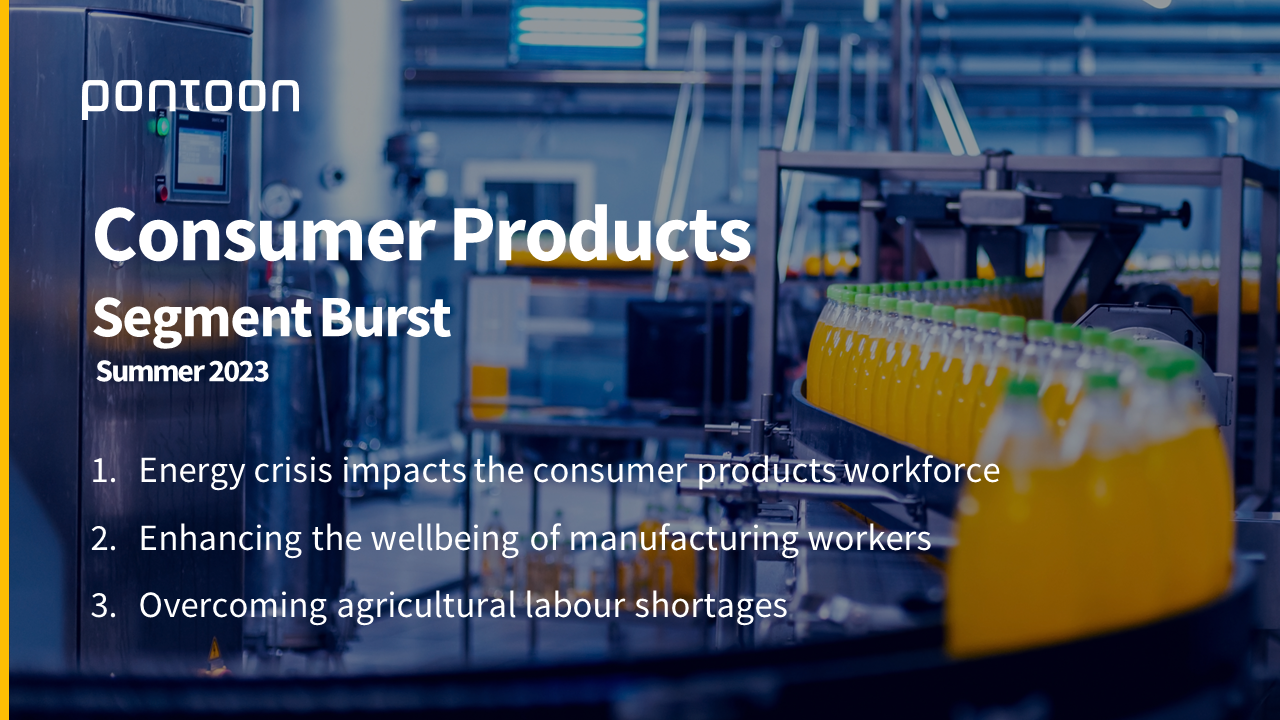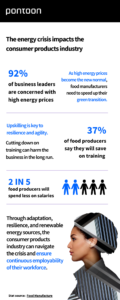Consumer Products Segment Burst: Summer 2023
Research
.
In the new volume of Consumer Products Segment Burst, we explore the most recent trends in the sector, including the impact of the energy crisis on the food manufacturing workforce and the need for improving workers’ wellbeing through better sick day policies. We also discuss strategies for overcoming talent shortages in global agriculture.
Energy crisis impacts the consumer products workforce
According to recent studies, 92% out of 2,300 leaders perceive the continuing instability of energy prices as a business threat. Some experts suggest that higher energy prices will be the global “new normal”, lingering for years, until the transition to renewables is complete.
The surge in energy costs presents challenges for consumer product companies, disrupting their operations and supply chains. Operational and transportation costs surge due to higher energy and fuel prices, impacting the delivery of raw materials and finished goods. This leads to delayed production schedules and potentially increased inventory holding costs.
To mitigate the financial strain, manufacturers may resort to cost-cutting measures, such as reducing production, implementing energy-saving measures, re-evaluating their transportation strategies, or seeking alternative energy sources. Unfortunately, some may be compelled to implement cost-saving measures that directly impact their employees. If energy challenges persist, two in five food producers will spend less on recruitment and salaries.
However, there are other options.
Technological innovation and workforce adaptability
While rising energy prices pose significant challenges, they also serve as a catalyst for innovation and technological advancements. Consumer product manufacturing companies can invest in energy-efficient machinery, automation, and renewable energy sources to reduce their reliance on traditional energy systems. All these technologies are already available. Implementing them not only helps to mitigate the impact of rising energy costs but also enhances productivity and competitiveness.
However, such changes require upskilling or reskilling the existing workforce to help them adapt to new technologies. Before this can happen, consumer products companies should consider tapping into green energy talent pools.
Through resilience, adaptation, and a focus on green energy solutions, the consumer products industry can navigate the energy crisis, pave the way for a sustainable future, and ensure continuous employability of their workforce.
Enhancing the wellbeing of manufacturing workers
The UK is experiencing an increase in sick leave, with workers across all industries collectively missing 185.6 million days of work last year due to sickness or injury. And yet, British workers still take fewer sick days (4 sick days on average) compared to their EU counterparts. For example, in Germany or the Netherlands, workers have stronger legal protections; higher sick pay results in employees taking more days off to fully recover (nearly 20 sick days in Germany and 11 in the Netherlands).
Rather than perceiving it as a threat to productivity, companies should embrace sick day policies as a way of boosting retention. By being able to recharge outside of work while still being paid (in the EU, anywhere from 70% to 100% of their salary, depending on legislation), workers might be more willing to stay with the company for longer.
The situation in the US is even more alarming. With no regulation of sick day policies on the federal level, 23% of American workers do not get a single paid sick day. 65% of hourly workers in the US tend to work when sick because they need the money.
A holistic approach to well-being
Working in manufacturing, warehousing, or retail often means that employees have limited access to healthcare and face higher risks of illness due to proximity to others or exposure to contaminants. It is thus crucial for consumer products companies to prioritise employee health and wellbeing. Apart from ensuring a safe working environment, employers should review their absence policies and sick pay structures, providing employees with the necessary support to take time off when needed.
Furthermore, employers should explore strategies to improve engagement and morale. Job satisfaction can contribute to overall well-being, increase retention, and potentially reduce the likelihood of sick leave. Almost half (47%) of organisations recognise employee wellbeing as a critical part of their workforce strategy. However, they’re yet to embrace a holistic vision of wellbeing that encompasses physical and mental health, social connectedness, financial security, job satisfaction, and a sense of community. When combined, these factors create a supportive culture that can significantly reduce attrition.
Overall, employers in the consumer products industry should be attentive to the unique challenges faced by their workforce and take proactive steps to address them. Prioritising employee health, providing adequate support, and promoting a positive work environment can contribute to a healthier and more productive workforce.
Overcoming agricultural labour shortages
The agricultural industry plays a vital role in food and beverage supply chains. However, according to the most recent report by the Royal Bank of Canada, several OECD countries face a concerning trend of an aging agricultural workforce. In Japan, for instance, an average farmer is 68 years old. In Canada, 40% of farm operators will retire by 2033 – and alarmingly, 66% of producers do not have a succession plan in place.
The aging workforce, combined with a lack of succession plan, poses a significant challenge for the industry’s future, as the transfer of knowledge, skills, and land ownership becomes increasingly uncertain.
Proactive measures must be taken by governments, educational institutions, and agricultural organisations to mitigate the risk of talent shortages. The key is to upskill the available workforce and facilitate the entry of new talent into the industry.
OECD countries are investing in developing human capital in agriculture. For instance, the agro-food industry in the Netherlands has been reliant on over 530,000 temporary and seasonal migrant workers. Today, the country is focusing on attracting highly skilled workers to eliminate uncertainties in the supply chain. Ongoing policy efforts are designed to integrate migrant labour into the workforce through targeted educational and training programmes.
By fostering education, innovation, and sustainable labour practices, companies and governments can build a resilient workforce and ensure the long-term success and sustainability of agriculture.
Strategies for empowering the agricultural workforce
(as recommended by OECD Trade and Agriculture Directorate)
- Enhance the perception of agriculture by emphasising career prospects within the sector. Recognise its evolving role in food security, environmental sustainability, biodiversity, and social considerations.
- Foster diversity and inclusion by welcoming individuals with a broader range of skills and backgrounds. This approach promotes innovation and brings fresh perspectives to agricultural practices.
- Align education with industry needs to meet the changing demands of the agro-food industry. Focus on building entrepreneurial and digital skills.
Related Post
In the new volume of Consumer Products Segment Burst, we explore the most recent trends in the sector, including:
Impact of robotics and automation on workers in the food & ...






